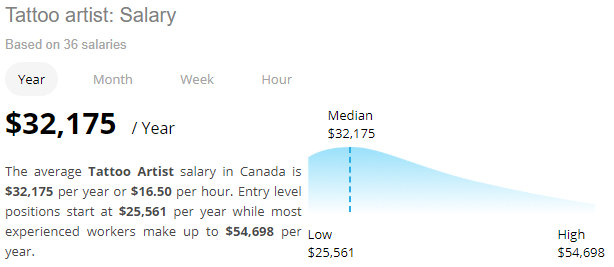How Much Money Can A Tattoo Artist Earn?

Tattoos have become mainstream. However, they can be incredibly expensive. The detail and effort that goes into creating art on the skin are difficult. However, not all tattoos are expensive. Since it has become popular, there are many shops with various price points, themes, and preferences. Therefore, we will take a look at the various amounts of money that tattoo artists can make both in the workforce and freelance. These numbers will most likely vary differently for a few factors. However, before we talk about the earnings, let’s define what a tattoo artist does.
What Is A Tattoo Artist?
A tattoo artist is someone who takes a piece of art and places it onto your skin. There are many places that are able to do tattoos. There are most likely hundreds in Toronto. However, not all parlors are good ones. Furthermore, there are many people who are not full-fledged tattoo artists. These people are called apprentices.
Similar to those found in trade jobs, apprentices work with a tattoo parlor, sometimes for free, to learn about the business. This is a good way to earn a little extra cash while learning this skill. However, there are tattoo artists who have a particular way of conducting business.
For example, there are tattoo artists who do not create designs. These tattoo artists want you to come in with a design already fleshed out. From there, the begin tattooing the are you’ve selected. Other artists create the designs and tattoo it onto you. Furthermore, there are people who do specific themes such as realism, zombies, cartoon, etc.
Regardless of the path, choose the one that you love doing the most and will present the best work. Of course, like any skill you get better with time. Therefore, in the beginning, you won’t be charging much. However, once you develop your portfolio and a name for yourself, you can start your own business.
Related Articles
- 4 High-Return P2P Lending Platforms For Canadian Investors
- How Much Money Can A Laundromat Make?
- Highest Paying Trade Jobs In Canada
- How Much Can An MUA Earn?
- How Much Money Can You Make On YouTube?
Average Income
The salary for a tattoo artist may or may not be what you expect. People pay hundreds to thousands of dollars per piece. Therefore, you’d think that the person doing the work would earn a lot. .Although this may be true in some instances. For many, they’re earning an average amount.
For a tattoo artist, based on 36 submitted salaries, earn on average $32,000 a year. The highest recorded salary peaking at nearly $55,000 with entry-level earnings of $25,000. Although these are some of the statistics, I can’t help but feel that tattoo artists earn more money than $55,000 per year. However, what is this feeling based off of? How about artists who do phenomenal work? Surely they get paid more than average. Those who market themselves incredibly well and have stunning work must earn more than the amount shown above.
To start, I understand that some tattoo artists earn a commission off the tattoos. However, there are artists who work within a shop who set their own prices and pay a certain fee or commission to the establishment. The other way that artists can get paid while in a shop is through renting. These artists will rent out space for a monthly, weekly or bi-weekly fee. Every artist and business will negotiate a different price. If you’re just starting out, a business might charge you a monthly fee because you won’t be bringing in that much traffic.
Quality Vs. Price
When you’re a tattoo artist, your prices fluctuate depending on your experience, detail, and brand. Therefore, there should be a benchmark for your prices. However, locations can also factor into how much you charge your clients. Although, this isn’t a rule set in stone. Just by mere observation, you’ll find more tattoo shops in the heart of downtown rather than in the suburbs. If you do find a few, they’ll most likely be cheaper. However, with a cheaper tattoo usually comes with a downgrade in quality. It all comes back to knowing your value and when it increases.
For example, I’ve seen portraits be done for a few hundreds of dollars. Whereas others have been done for a few thousand. The point is that you need to find the line where the price meets your quality. If you can put your work next to those in the upper echelon of the industry, charge a few hundred per hour. If not, settle for something lower where you can make money, develop your skills and build your portfolio.
Lastly, being marketable will help you sell your work and prices. This goes for any business. If someone hears that you do great work even though you’re pricey, people will still come. Remember tattoos are on your body forever. Therefore, people will spend the extra money for that little bit of security.
Workforce
When I receive my first few tattoos, I always wondered whether or not my artist had tried to open their own business. Therefore, I asked him. His response was quite interesting and not what I had anticipated. It showed that for many people, especially those who do what they love, tattooing is about more than money. When I was there, I asked him if he’d ever open his own business.
He informed me that he did open his own business. However, when running your own operation, it becomes more about running the business than focusing on the art itself. It struck me that for some people if you’re earning enough money while being employed by a shop, that’s good enough. Fulfillment comes in many different ways and if you can be comfortable while doing what you love, that is a win.
There are those who will love being freelance more. When working in a shop, your earnings can be capped. Furthermore, you won’t earn as much as if you were to own a business. As stated earlier, there are two ways to get paid. Renting out space and/or paying the shop a certain fee. This fee can eat into your earnings. Furthermore, if you’re paying the shop a chunk of your earnings, they may charge fees as high as 40%.
When you break it down it may not seem that bad. For a $100 tattoo that lasted 1 hour, you only earn $60. That’s still $60/h. However, the amount paid adds up and you essentially gave away 40% of your effort. For most people who’re serious about becoming a tattoo artist, I’d suggest starting in these shops. You can earn some money while learning as an apprentice You can learn about the business and even be hired as a full tattoo artist at the end of your apprenticeship.
Private Practice/Freelance
Owning a private practice or a physical shop is a lot of responsibility. However, your potential for earning is a lot higher. As stated previously, when you own a business, tattooing becomes about more than just the art. You have a business to run. Therefore, you must create your business around delivering great service, products while trying to earn money. However, you’ll have a lot of responsibility. If you’re a freelancer who goes to people’s places or operates out of your home, you can cut a considerable amount of costs. However, if you’re planning on opening your own shop, there are a few critical things to consider.
Hygiene. You must be extremely hygienic and follow all the necessary precautions. Health and safety standards are no laughing manner. Furthermore, the last thing you want is to get sued. Next is the fact that you’ll be responsible for other people’s livelihood. That means if you’re business is not performing well, you’ll be affecting them greatly. However, there are many benefits.
Once you open a shop, you have the ability to hire employees and charge them any of the two ways that were explained above. Furthermore, you can have a base price for tattoos. You can also sell other products like tattoo glue. Furthermore, you are able to offer other services such as cover-ups, laser tattoo removal, and piercings.
Maybe expand your reach by creating a YouTube channel or blog posts. However, word of mouth will be your best friend. In Toronto, one of the most popular tattoo shops is Chronic Ink. Everyone I know has heard of it from someone else because they’re known to do amazing work. Therefore, building a good reputation will be your biggest advantage as a business owner in any field.

Shameed is just a man on a mission to help those around him gain financial success. Obsessed with writing about all things finance, this GTA native is constantly learning and sharing his experiences with others.




